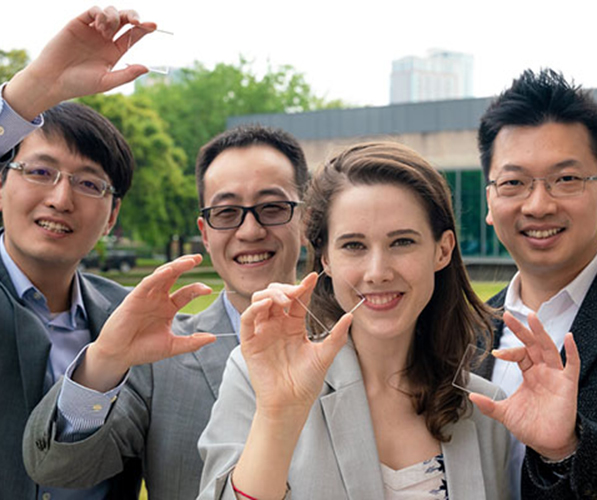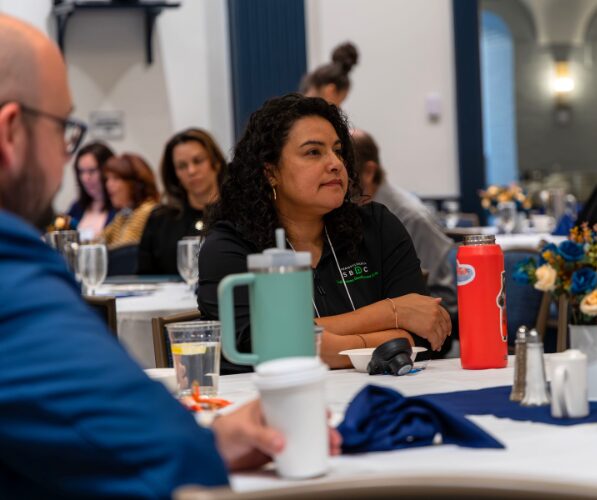Success Story
LESS is more for Penn State alumnus Birgitt Boschitsch
Birgitt Boschitsch is cleaning up the world. One toilet at a time.
Boschitsch co-founded spotLESS Materials with Dr. Tak-Sing Wong based on a discovery made by her lab mate and fellow doctoral student, Jing Wang. Wang developed a liquid-entrenched smooth surface (LESS) coating that can be applied to glass, some metals, and ceramic to enable them to more efficiently repel water and dirt –subsequently making them easier to clean.
The team worked to develop the bio-inspired material in Dr. Tak-Sing Wong’s Laboratory for Nature Inspired Engineering, housed within the Department of Mechanical Engineering and the Materials Research Institute at Penn State. Wong is also one of the company’s co-founders and serves as its chief technical officer.
SpotLESS helps solve the real-world problem of repelling “sludge,” by using less water in places where water is like gold. And, while the coating can be applied to windows, windshields and other surfaces to more efficiently repel water and dirt, sanitation applications are getting a significant amount of attention because of the its potential benefit to humankind.
Take, for example, toilets. SpotLESS dramatically reduces the amount of water needed to flush a conventional toilet – from six liters to three liters. That’s really important, especially if you’re in one of the world’s developing countries with a limited sewage infrastructure.
The coating is a two-step spray that can, for example, be applied to a ceramic toilet bowl within five minutes – using molecularly grafted polymers to build an extremely smooth and liquid-repellent foundation. The first spray dries into thin, hair-like structures so small they aren’t visible to the human eye. The second lubricant coats the “hairs,” making waste, water, and even bacteria slide off more easily.
Boschitsch and her colleagues discovered that while most coatings repel liquid, they lack in their ability to repel sludge-like material. Boschitsch says, “By focusing on a coating that can repel human waste, we felt we could use the technology to improve our world, which is an important part of not only our company, but about the Penn State entrepreneurial commitment to doing good.”
Her work is not going unnoticed.
Boschitsch recently was named one of Forbes’ 30 Under 30 innovators for 2020, which recognizes the accomplishments of leaders across 20 industries, all under 30 years old.
“It’s incredibly exciting to work with others to create a material that could have a positive and lasting human impact, and to be recognized for the hard work we have done is equally exciting,” she said. “We have a passion for addressing global challenges facing humanity and using technology for good.”
Boschitsch earned her Ph.D. in Mechanical Engineering in 2018 from Penn State’s College of Engineering and today serves as principal investigator for ongoing projects at spotLESS, including the work on a Small Business Innovation Research grant from the National Science Foundation for sanitation applications, as well as a $150,000 contract with the Office of Naval Research.
Under her leadership, the spotLESS team placed third in the Rice Business Plan Competition and she successfully led her team through the San Francisco area-based Y-Combinator in 2019, which provided $150,000 in seed funding.
Boschitsch said the company has also received support from the Ben Franklin Technology Partners’ TechCelerator, as well as a $50,000 grant from the Department of Energy’s Cleantech University Prize Competition. As spotLESS heads into 2020, Boschitsch said the company has already arranged more than 10 pilot programs in the U.S. and abroad with others in the wings.
With all of the accolades, funding and attention the company has received since just 2018, Boschitsch is quick to credit the entrepreneurial ecosystem at Penn State for collaborating with her team and fostering the company’s rapid growth.
“Tim Hurley and Matthew Smith from the Office of Technology Management were instrumental in helping us understand the technical licensing process, so we could get the product out of the lab and on the path to commercialization,” she said. SpotLESS maintains two patents licensed from Penn State University. Hurley and Smith both serve as senior technology licensing officers and commercialization strategists for Penn State’s Office of the Senior Vice President for Research.
Boschitsch and her colleagues aren’t waiting for what’s next. They are making next happen. In November of 2019, the team rolled out a public-facing website, which allows consumers to directly purchase the spotLESS material.
“We want to get the product into the hands of people who can use it – to give them an opportunity to begin saving water right in their own homes or businesses,” she said. “We quickly learned that sticky problems are not unique to sanitation. From automotive application to medical, surfaces get dirty.”






